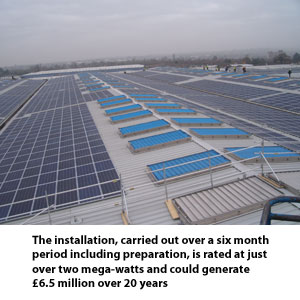 As the domestic RHI launches (9th April) heat pump manufacturers remain optimistic that the demand for domestic installations will increase, but stress the importance of correct specification, installation and maintenance.
As the domestic RHI launches (9th April) heat pump manufacturers remain optimistic that the demand for domestic installations will increase, but stress the importance of correct specification, installation and maintenance.
Here we’ve collated leading manufacturers’ reactions:
Dimplex Renewables
Dimplex Renewables has said that now that a start date has been announced, with guaranteed tariffs for eligible installations over the next seven years, the company is expecting to see a surge in the number of renewable heat installations.
Clyde MacVeigh, marketing director for Dimplex Renewables, said: “This is the news that everybody in the industry has been waiting for. Finally, consumers can have the confidence to go ahead with the installation of heat pumps, solar thermal and other technologies knowing they will be rewarded for the renewable heat they generate.
“We know there are home owners who are interested in renewable heating technologies but after all the delays this scheme has faced, many were not even speaking to installers until they knew for sure that the funding would be there.
“The next step now is to make sure that everybody in the industry – the government, manufacturers and installers – makes every effort to publicise the funding and raise knowledge among homeowners. There is a fantastic opportunity for householders to make significant savings to their heating bills with lower payback periods than they might expect.”
NIBE
NIBE agrees that the launch should act as a huge confidence boost for the industry, but adds that industry now needs to take responsibility in delivering the scheme to the best of its ability.
“The domestic RHI is set to be a game changer for the renewable heating industry, and after a long period of uncertainty and delays,” said Phil Hurley, managing director at NIBE.
“However, now that the scheme is in place it is vital that we don’t turn our attention away from the industry’s role in making it a success. As well as continuing to develop high-performance solutions to meet domestic heating needs, we need to focus on upholding the highest possible standards at every stage of the installation process – with a fully trained workforce to specify, design, install and maintain systems correctly.
“To ensure the RHI vision now translates into reality, it’s paramount that the industry pulls together to become the mouthpiece for the scheme. Effective marketing is the only way to drive consumer awareness about the long-term financial and environmental benefits of renewables. Spreading the right message now will lessen the need for incentives like the RHI in the future, and will help lay the foundations for sustained, organic market growth.”
Mitsubishi Electric
Mitsubishi Electric also expects to see an increase in demand.
John Kellett, general manager of the company’s heating systems said: “The domestic RHI makes the case for heat pumps much stronger, especially against carbon-intensive and expensive technologies such as oil, LPG and direct electric.
“We know air source heat pumps are one of the most straightforward renewable technologies to install and that they will provide a constant, comfortable level of heat to a building while lowering running costs and reducing carbon emissions.”
The company has also produced a dedicated website which demonstrates how much a household can receive in RHI payments and how much they will save over gas, oil and LPG heating.
Daikin
Daikin said the eagerly-awaited launch should give the industry a massive boost.
“It will provide financial help to households wishing to make the switch to renewable heating and is a really important step in providing a secure UK energy infrastructure and in reducing carbon emissions,” David Lacey, commercial director of heating and renewables at Daikin UK.
Kensa
Kensa said the domestic RHI’s arrival should ensure a renewed focus on ground source heat pumps as a compelling heating choice for every type of residence, which is welcome news to a supply chain that has been remarkably patient throughout the policy’s lengthy gestation period.
The company recognises there is still plenty of work to be done to ensure the emergence of heat pumps is handled in a fashion that creates sustained interest but said the launch of the RHI represents a significant step in the development of the industry.
 After an extensive tender process, Graham and Jewson have been appointed by the Places for People Group, one of the largest property management, development and regeneration companies in the UK.
After an extensive tender process, Graham and Jewson have been appointed by the Places for People Group, one of the largest property management, development and regeneration companies in the UK.



 The Chancellor’s decision to exempt Combined Heat and Power (CHP) from the “carbon floor price” as part of the 2014 Budget review has been welcomed by a leading commercial and industrial heating manufacturer.
The Chancellor’s decision to exempt Combined Heat and Power (CHP) from the “carbon floor price” as part of the 2014 Budget review has been welcomed by a leading commercial and industrial heating manufacturer.